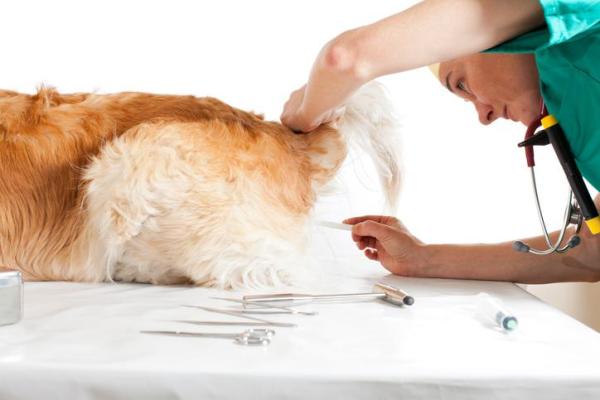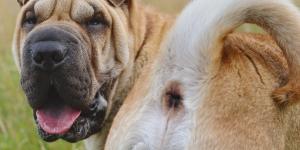My Dog's Anus Smells Fishy



See files for Dogs
There is a misconception that it is OK for a dog to smell bad. Of course, their lifestyle means they will exude certain scents and there is a natural odor to a healthy dog which can be a little musky. However, the worse a dog smells, the worse their health is likely to be. The reason for a dog smelling bad can be due to a variety of causes. These can be hygiene related, circumstantial or even due to a pathology. We can help to know the reason why a dog smells by both locating the region it comes from and the type of the smell.
When the foul odor comes from a dog's rear, it points towards certain specific causes. At AnimalWised, we understand these possible causes in our article on why my dog's anus smells fishy.
Why does the anus smell fishy?
As stated in the introduction, the type of odor present on the dog can help us to understand what is the problem. When it comes to the dog's rear, we may smell a fecal odor. This can be a problem with the dog's bowels. Perhaps they have diarrhea and some fecal matter is sticking to their fur. This is common in longhaired dogs. There are a wide range of reasons why a dog has gastrointestinal problems, something we discuss in our article on types of diarrhea in dogs.
However, it is unlikely the fishy smell comes from fecal matter. Even if a dog eats fish, their stools would have a distinct fecal odor. If the dog's anus smells fishy, it is more likely due to the dog's anal glands. Anal glands in dogs are two sacs located just beside the dog's anus. If they were clocks hands, they would be in the 5 and 7 positions.
Dog anal glands are important in canine communication. They contain and oily viscous liquid which has an unpleasant odor to humans. Within this odor are pheromones specific to each dog which not only make them recognizable to other dogs, but they can tell them about their state of health. This is why we see dogs sniff each other's butts when they are first introduced.
The secreted fluid from the anal sacs also allow the dog to defecate more easily as they lubricate feces egesting from the anus. This can be helpful if the dog is constipated or suffering other digestive disorders. Even a healthy dog will have a slight fishy smell when they secrete anal fluid. However, if this fluid builds up or the dog has problems with their anal glands, the smell is much more noticeable. We see why in the sections below.

Symptoms of anal gland problems
The reason why my dog's anus smells fishy is usually due to a problem or malfunction of the anal glands, rather than the anus itself. When the dog has a problem with their anal glands, they will display more symptoms than a fishy odor. They will also show some combination of the following:
- Dragging their anus on the floor
- Difficulty sitting upright on their rear due to discomfort (in severe cases)
- Persistent licking of the private area
- Pain when defecating
- Constipation
- Tail chasing
- Inflammation/pain in the perianal area
- Fever and discomfort
When the anal fluid builds up, it can cause many problems. Some are due to the primary cause, others are due to secondary developments.

Causes of anal gland disorders in dogs
When the dog's anal glands are not emptied, the anal gland will swell since the fluid cannot escape. This can be due to various reasons and result in different problems for the dog, more than just a fishy smell.
- Impaction or retention: refers to the glands remaining full and distended. This is because the dense liquid cannot escape through the gland ducts. Since the glands are beside the anus, fecal matter can impact the glands and prevent the fluid coming out. This is more common in older dogs. The wear and tear of age can cause the anal glands to become impacted more easily.
- Infection and inflammation (saculitis): impaction can result in an infection. In these cases, the fishy smell of the anus will be much stronger, the discharge will turn yellow and, once diagnosed, will require antibiotic treatment. This is in addition to emptying and cleaning. It is not surprising to see that the dog spills liquid through the anus with the aforementioned characteristics.
- Abscess: this is often the third step after impaction and infection. The inflammation produced by the infectious process causes an abscess that is able to open the skin and even creates a perianal fistula since the fluid has to go somewhere. This can be seen if a lump appears near the anus which isn't the glands. It causes fever and requires antibiotics, drainage, and cleaning. In more severe or recurring cases, surgery may be necessary to remove the glands.
As we can see, all these disorders can explain why our dog's anus smells fishy. Additionally, skin tumors such as adenocarcinomas may occur in the anal glands. These can be benign or malignant, usually depending on testosterone levels. The latter can metastasize to the lung, although surgical removal is recommended in both cases. Sterilization is also recommended because it favors the regression of tumors, since they occur more in adult males older than 7 years of age.

How to avoid problems in dog anal glands
Now we know why our dog's anus smells like fish, we will discuss ways to reduce this unpleasant odor. The preventive measure we can take include the following:
- Treat the dog at the appearance of the first symptom. Do not wait for the clinical picture to get complicated before seeking veterinary help.
- If our dog is prone to anal fluid accumulation, we should add regular dog anal gland expression to their care routine. This can be done at home by the dog's guardian, but it is also possible the veterinarian or dog groomer can do it for you.
- The characteristics of the dog's stools are known to influence the health of the anal glands. Chronic diarrhea, small or too soft stools do not press well on the glands when excreted. This makes it easier for them to accumulate the lubricating fluid. A correct diet helps with this elimination.
- It is also known there are breeds with a propensity to suffer problems in the glands. If we live with a German Shepherd, Chihuahua or Poodle, for example, we must pay special attention to this aspect.
When a dog has a serious problem with their anus, it can bleed. This is not usually due to anal gland problems, but the problem could be related. Our article on why a dog is bleeding from their anus may help to understand more.
This article is purely informative. AnimalWised does not have the authority to prescribe any veterinary treatment or create a diagnosis. We invite you to take your pet to the veterinarian if they are suffering from any condition or pain.
If you want to read similar articles to My Dog's Anus Smells Fishy, we recommend you visit our Other health problems category.








